Title: Top emerging technologies: Nanogenerators and Nanopiezotronics
Speaker: Prof. Zhong Lin (Z.L.) Wang, School of Materials Science and Engineering, Georgia Institute of Technology, Atlanta USA
Time: April 27, 2009,6:30 P.M
Venue: Room A101 At WNLO
Abstract:
Developing novel technologies for wireless nanodevices and nanosystems are of critical importance for sensing, medical science, defense technology and even personal electronics. It is highly desired for wireless devices and even required for implanted biomedical devices to be self-powered without using battery. Therefore, it is essential to explore innovative nanotechnologies for converting mechanical energy (such as body movement, muscle stretching), vibration energy (such as acoustic/ultrasonic wave), and hydraulic energy (such as body fluid and blood flow) into electric energy that will be used to power nanodevices without using battery. We have demonstrated an innovative approach for converting mechanical energy into electric energy by piezoelectric zinc oxide nanowire (NW) arrays. The operation mechanism of the electric generator relies on the unique coupling of piezoelectric and semiconducting dual properties of ZnO as well as the elegant rectifying function of the Schottky barrier formed between the metal tip and the NW. Based on this mechanism, we have recently developed DC nanogenerator driven by ultrasonic wave in bio-fluid. We have also used textile fibers for energy harvesting. This presentation will introduce the fundamental principle of nanogenerator and its potential applications. Finally, a new field on nano-piezotronics is introduced, which uses piezoelectric-semiconducting coupled property for fabricating novel and unique electronic devices and components.
Biography:
Dr. Zhong Lin (ZL) Wang is a Regents' Professor, COE Distinguished Professor and Director, Center for Nanostructure Characterization, at Georgia Tech. He has authored and co-authored four scientific reference and textbooks and over 580 peer reviewed journal articles, 55 review papers and book chapters, edited and co-edited 14 volumes of books on nanotechnology, and held 20 patents and provisional patents. Dr. Wang is the world’s top 10 most cited authors in nanotechnology and materials science. His entire publications have been cited for over 27,000 times. The H-index of his citations is 80. He was elected to a fellow of American Physical Society in 2005, fellow of AAAS in 2006, and fellow of Materials Research Society in 2009. He has received the 2001 S.T. Li prize for Outstanding Contribution in Nanoscience and Nanotechnology, the 2000 and 2005 Georgia Tech Outstanding Faculty Research Author Awards, Sigma Xi 2005 sustain research awards, Sigma Xi 1998, 2002, 2004, 2006, 2008 and 2009 best paper awards, the 1999 Burton Medal from Microscopy Society of America, and the 2009 Purdy award from American ceramic society.
